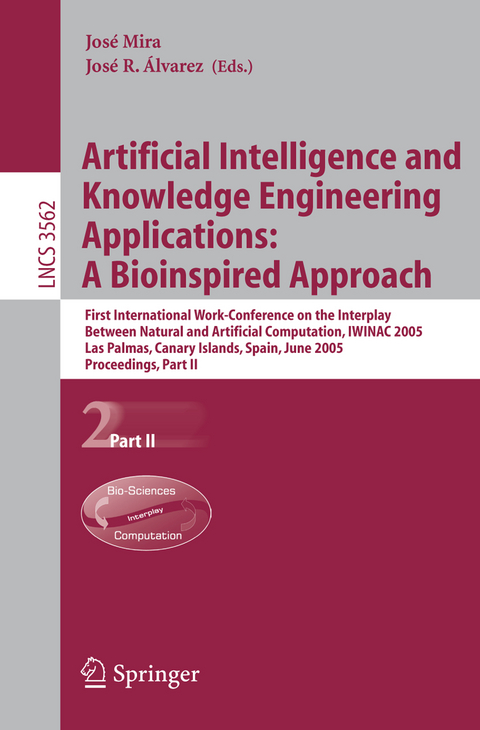
Artificial Intelligence and Knowledge Engineering Applications: A Bioinspired Approach
Springer Berlin (Verlag)
978-3-540-26319-7 (ISBN)
Evolutionary Computation.- Cultural Operators for a Quantum-Inspired Evolutionary Algorithm Applied to Numerical Optimization Problems.- New Codification Schemas for Scheduling with Genetic Algorithms.- Solving the Multidimensional Knapsack Problem Using an Evolutionary Algorithm Hybridized with Branch and Bound.- Cryptanalysis of Substitution Ciphers Using Scatter Search.- Combining Metaheuristics and Exact Algorithms in Combinatorial Optimization: A Survey and Classification.- Convergence Analysis of a GA-ICA Algorithm.- An Evolutionary Strategy for the Multidimensional 0-1 Knapsack Problem Based on Genetic Computation of Surrogate Multipliers.- An Evolutionary Approach to Designing and Solving Fuzzy Job-Shop Problems.- Memetic Algorithms with Partial Lamarckism for the Shortest Common Supersequence Problem.- 2D and 3D Pictural Networks of Evolutionary Processors.- Analysing Sentences with Networks of Evolutionary Processors.- Simulating Evolutionary Algorithms with Eco-grammar Systems.- Timed Accepting Hybrid Networks of Evolutionary Processors.- A New Immunotronic Approach to Hardware Fault Detection Using Symbiotic Evolution.- A Basic Approach to Reduce the Complexity of a Self-generated Fuzzy Rule-Table for Function Approximation by Use of Symbolic Regression in 1D and 2D Cases.- Parallel Evolutionary Computation: Application of an EA to Controller Design.- MEPIDS: Multi-Expression Programming for Intrusion Detection System.- A Study of Heuristic Techniques Inspired in Natural Process for the Solution of the Container Fill Problem.- Attribute Grammar Evolution.- Evolution and Evaluation in Knowledge Fusion System.- The Allele Meta-model - Developing a Common Language for Genetic Algorithms.- Using Bees to Solve a Data-Mining Problem Expressed as a Max-Sat One.-A Comparison of GA and PSO for Excess Return Evaluation in Stock Markets.- Nonlinear Robust Identification Using Multiobjective Evolutionary Algorithms.- Genetic Algorithms for Multiobjective Controller Design.- Grammar Based Crossover Operator in Genetic Programming.- GA-Selection Revisited from an ES-Driven Point of View.- Agent WiSARD in a 3D World.- One Generalization of the Naive Bayes to Fuzzy Sets and the Design of the Fuzzy Naive Bayes Classifier.- Towards a Methodology to Search for Near-Optimal Representations in Classification Problems.- Playing a Toy-Grammar with GCS.- A Genetic Approach to Data Dimensionality Reduction Using a Special Initial Population.- Engineering Optimizations via Nature-Inspired Virtual Bee Algorithms.- Solving Partitioning Problem in Codesign with Ant Colonies.- Electronics and Robotics.- A Neuromimetic Integrated Circuit for Interactive Real-Time Simulation.- A FPGA Architecture of Blind Source Separation and Real Time Implementation.- Description and Simulation of Bio-inspired Systems Using VHDL-AMS.- Transistor-Level Circuit Experiments Using Evolvable Hardware.- An Electronic Reconfigurable Neural Architecture for Intrusion Detection.- Construction and VHDL Implementation of a Fully Local Network with Good Reconstruction Properties of the Inputs.- Reconfigurable Hardware Implementation of Neural Networks for Humanoid Locomotion.- An Associative Cortical Model of Language Understanding and Action Planning.- Neural Clustering Analysis of Macroevolutionary and Genetic Algorithms in the Evolution of Robot Controllers.- Induced Behavior in a Real Agent Using the Multilevel Darwinist Brain.- Landscaping Model for Virtual Environment.- Other Applications.- Sensitivity from Short-Term Memory vs. Stability from Long-Term Memory inVisual Attention Method.- Visual Attention, Visual Saliency, and Eye Movements During the Inspection of Natural Scenes.- Model Performance for Visual Attention in Real 3D Color Scenes.- On the Evolution of Formal Models and Artificial Neural Architectures for Visual Motion Detection.- Estimation of Fuel Moisture Content Using Neural Networks.- Adjustment of Surveillance Video Systems by a Performance Evaluation Function.- Application of Machine Learning Techniques for Simplifying the Association Problem in a Video Surveillance System.- A Neurocalibration Model for Autonomous Vehicle Navigation.- Some Remarks on the Application of Artificial Neural Networks to Optical Character Recognition.- Using Fuzzy Clustering Technique for Function Approximation to Approximate ECG Signals.- Information Retrieval and Classification with Wavelets and Support Vector Machines.- A New Approach to Clustering and Object Detection with Independent Component Analysis.- Bispectra Analysis-Based VAD for Robust Speech Recognition.- On-line Training of Neural Networks: A Sliding Window Approach for the Levenberg-Marquardt Algorithm.- Boosting Parallel Perceptrons for Label Noise Reduction in Classification Problems.- On the Connection Between the Human Visual System and Independent Component Analysis.- Image Classifier for the TJ-II Thomson Scattering Diagnostic: Evaluation with a Feed Forward Neural Network.- Computerized Adaptive Tests and Item Response Theory on a Distance Education Platform.- Stochastic Vs Deterministic Traffic Simulator. Comparative Study for Its Use Within a Traffic Light Cycles Optimization Architecture.
| Erscheint lt. Verlag | 13.6.2005 |
|---|---|
| Reihe/Serie | Lecture Notes in Computer Science | Theoretical Computer Science and General Issues |
| Zusatzinfo | XXIV, 638 p. |
| Verlagsort | Berlin |
| Sprache | englisch |
| Maße | 155 x 235 mm |
| Gewicht | 916 g |
| Themenwelt | Informatik ► Software Entwicklung ► User Interfaces (HCI) |
| Informatik ► Theorie / Studium ► Algorithmen | |
| Naturwissenschaften ► Biologie ► Evolution | |
| Schlagworte | Algorithm analysis and problem complexity • Artificial Neural Networks • bio-inspired computing • brain-like computing • Computational Neuroscience • evolutionary algorithms • Genetic algorithms • Intelligence • Lamarck • learning • machine learning • neural classifier systems • neural computing • neural learning • Neural networks • neuronal modelling • neuroscie • Neuroscience • Optimization • Robotics • Simulation |
| ISBN-10 | 3-540-26319-5 / 3540263195 |
| ISBN-13 | 978-3-540-26319-7 / 9783540263197 |
| Zustand | Neuware |
| Haben Sie eine Frage zum Produkt? |
aus dem Bereich


